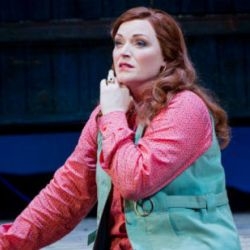The Bartered Bride (Opera North – tour)
Smetana’s rich comic opera cunningly updated to 1960s Czechoslovakia by Opera North

© Robert Workman
So do we exchange jolly peasants for glowering apparatchiks? Hardly – this is as entertaining a version of Smetana’s opera as you could wish, but the celebration of Czech nationalism has extra edge from our recognition of the oppressors, as in the added speech for Peter Bodenham‘s flamboyant Ringmaster which moves from execrable jokes to topical satire.
Here is none of the quaintness of a distant time and place. The villagers – in the form of Opera North’s splendidly versatile chorus – are recognisable individuals and Liberation Day is the perfect excuse for song, dance and the circus. The 'folk' elements fit naturally with the brand of nationalism fostered by the Soviets; the opening chorus becomes a formal choir rehearsal, not a spontaneous outpouring of joy; the all-powerful marriage broker Kecal transmutes painlessly into the local party boss – and finally, in the humiliation of the circus’s 'Russian bear' and the breaking of the power of Mayor Kecal, we can imagine the imminent demise of the Soviet system.
The deal that proves Kecal’s downfall – a case of the trickster tricked – involves one bride, Mařenka, and two suitors, Jeník whom she loves and Vašek whom she has never met. However, she is to be given to Vašek as 'payment' for her father’s debt to Tobias Micha, Vašek’s rich city-dwelling father. Kecal has brokered the deal and stakes his reputation on it.
'down-to-earth, strongly sung performances'
The Bartered Bride is an opera where the background almost becomes the foreground. The dances, though only added in a revised version, are at the heart of the work, and under Anthony Kraus the orchestra kicks off with a sparkling treatment of the overture and never lets up through Polka, Furiant or "Dance of the Comedians". Here the designs of Robert Innes Hopkins and the choreography of Vanessa Gray and Tim Claydon are at their most striking, with acrobats and jugglers tumbling colourfully and chaotically out of a circus caravan and filling the stage with routines constantly on the brink of collapse.
Kate Valentine (Mařenka) and Brenden Gunnell (Jeník) are hardly conventionally romantic lovers; both give down-to-earth, strongly sung performances that grow in intensity in the act 3 quarrel and reconciliation. James Creswell radiates self-importance as Kecal, his smooth controlled singing full of sly hints rather than buffo bluster. As the shyly bewildered Vašek, stammering effortfully in the purest of tenors, Nicholas Watts is as sympathetic as he is funny, and there is luxury casting for the parents in the shape of Peter Savidge and Ann Taylor, humble harried peasants who occasionally stand up for their rights. Stephen Richardson, meanwhile, exudes wealth as Tobias Micha, with Fiona Kimm magnificently malevolent as his wife.












